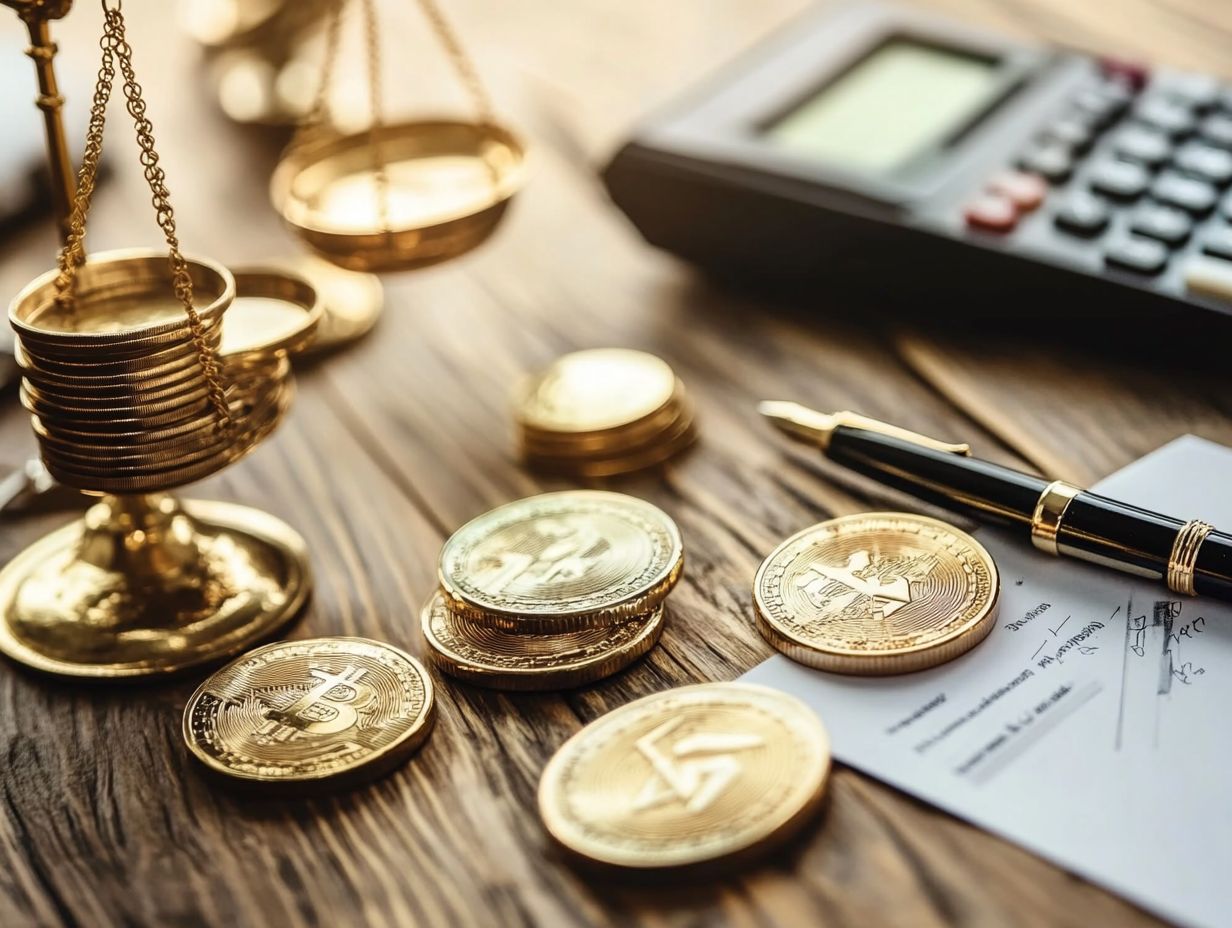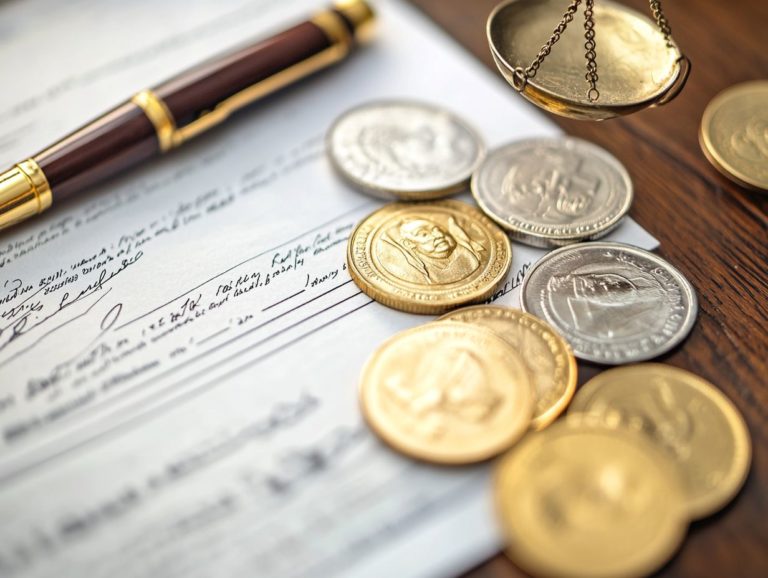Tax Implications of Precious Metals in Your Estate Plan
Let s dive into the exciting world of estate planning! Estate planning goes beyond merely drafting wills and trusts; it encompasses valuable assets like precious metals.
Understanding how to incorporate gold, silver, and platinum into your estate can profoundly influence your legacy and financial well-being. In this guide, you will discover strategies to reduce taxes and considerations specific to different types of metals.
Whether you re a seasoned investor or just starting your journey, this guide will offer insights to enhance your estate planning efforts effectively.
Contents
- Key Takeaways:
- Role of Precious Metals in Estate Planning
- Understanding Estate Planning with Precious Metals
- Tax Implications of Including Precious Metals in Your Estate
- Strategies for Minimizing Tax Impact
- Considerations for Specific Types of Precious Metals
- Frequently Asked Questions
- What are the tax implications of including precious metals in my estate plan?
- Are there any tax exemptions for precious metals in estate planning?
- Maximize Your Inheritance: Minimizing Taxes with Precious Metals
- Tax Implications of Precious Metals in an IRA
- Ensure Your Heirs Aren’t Burdened with High Taxes
- Don’t Delay! Update Your Estate Plan
Key Takeaways:

Role of Precious Metals in Estate Planning
Precious metals, such as gold and silver, are invaluable in estate planning. They serve as tangible investments and powerful tools for wealth preservation.
These metals help mitigate estate taxes while maintaining value over time. Their intrinsic market value tends to appreciate, acting as an effective hedge against inflation, which can erode the purchasing power of cash. Understanding the tax impact of precious metals can further enhance your financial strategy.
Unlike other investments that may experience volatility, holding these metals physically provides you with a stable asset that can be easily passed on to your heirs. This transfer not only secures financial continuity but also allows future generations to inherit a legacy that maintains its worth.
By integrating such assets into your estate plan, you establish a robust foundation for your family’s financial future.
Understanding Estate Planning with Precious Metals
Estate planning with precious metals like gold and silver requires thoughtful strategies to safeguard and transfer your wealth to heirs. It also addresses legal and tax considerations.
This process often involves collaborating with financial advisors and establishing trusts to protect your physical assets and streamline estate management.
By incorporating precious metals into your estate plan, you not only strengthen your investment portfolio but also craft a robust strategy for wealth preservation and capital gains. Additionally, understanding the tax impact of precious metals can lay a solid foundation for your financial future.
What is Estate Planning?
Estate planning is your comprehensive strategy for managing and distributing your assets when the time comes. It ensures that your financial future and personal wishes are respected.
This involves thoughtful consideration of your heirs, creating essential legal documents such as wills and trusts, and developing strategies to minimize tax implications.
An effective estate plan includes several critical components: well-detailed wills that specify how your assets will be distributed, trusts that dictate the timing and manner in which beneficiaries receive their inheritance, and powers of attorney that appoint trustworthy individuals to make medical or financial decisions on your behalf should you become unable to do so.
These legal instruments not only streamline the transition of your assets but also protect your heirs’ interests by potentially reducing estate taxes and avoiding probate.
This allows your loved ones to inherit directly, without unnecessary delays or complications. By prioritizing the security of your heirs interests, a thoughtfully structured estate plan can significantly impact family dynamics and financial stability for generations to come.
Tax Implications of Including Precious Metals in Your Estate
Incorporating precious metals into your estate can lead to considerable tax implications, especially concerning capital gains tax and inheritance tax. This requires a thoughtful approach to ensure compliance with IRS regulations while maximizing your estate’s value.
Understanding these tax obligations is crucial for effective estate planning and strategic wealth management.
Capital Gains Tax

The capital gains tax is crucial when selling precious metals like gold and silver. This tax applies to the profit made from their sale and must be reported to the IRS.
Understanding this tax can significantly affect your net returns. It differentiates between short-term gains profits from assets held for one year or less and long-term gains, for assets held over a year.
Short-term gains are taxed at your standard income rate. In contrast, long-term gains benefit from lower tax rates, so holding onto your investments can be worthwhile.
If you re selling precious metals, meticulously track your purchase prices and sale values. Accurate records are essential for meeting IRS guidelines and avoiding penalties.
Inheritance Tax
Inheritance tax can significantly affect how you pass precious metals to your heirs. It s vital to understand the exemptions and liabilities related to estate taxes in your planning.
Navigating inheritance tax requires a clear strategy. Specific exemptions may apply to precious metals, like coins, bullion, or jewelry, which can sometimes be excluded from taxes.
By using strategies like trusts or gifting assets ahead of time, you can lessen the tax burden on your beneficiaries. Consulting a financial advisor experienced in estate planning can provide valuable insights.
Strategies for Minimizing Tax Impact
Effective strategies can minimize tax impacts in estate planning. Use tools like trusts and ownership transfer mechanisms to protect your assets.
Transferring Ownership During Your Lifetime
Transferring ownership of precious metals while you re still alive can be a smart estate planning move. It helps reduce potential tax implications and ensures your heirs benefit directly.
By strategically gifting or selling these assets, you can avoid hefty estate taxes. This approach allows your loved ones to inherit a more significant legacy.
This thoughtful process provides peace of mind and eases the transition for your heirs. They will appreciate not only the tangible worth but also the sentimental ties to family history.
Utilizing Trusts and Other Estate Planning Tools
Trusts and other estate planning tools can improve your management and distribution of precious metals. They offer crucial advantages in wealth management.
Different types of trusts like revocable and irrevocable trusts serve specific roles in estate planning. Each type allows you to control how your assets are managed and distributed.
A revocable trust allows for changes during your lifetime. An irrevocable trust provides financial security and can lower tax liabilities.
Trusts also simplify the transfer process, reducing legal issues and potential heir disputes. This helps preserve your family’s legacy.
Considerations for Specific Types of Precious Metals

When planning your estate, think about the unique features and effects of various precious metals like gold, silver, and platinum. Each metal has distinct market values and investment strategies that can significantly influence your overall asset portfolio.
Gold
Gold stands out as a premier investment in precious metals. It is celebrated for its stability in market value and crucial role in wealth preservation. This popularity makes gold a must-have in your estate strategy!
With a rich history as a symbol of wealth, gold has served as currency and a safeguard against inflation and economic downturns for centuries. Incorporating gold into your estate plan unlocks significant advantages, including diversification and a protective measure against currency devaluation. Additionally, it’s important to understand taxation for precious metals secured loans to fully capitalize on these benefits.
Considering the investment potential of gold can help your heirs maximize their inherited wealth. However, understanding luxury taxes on precious metals is crucial, as these can impact your estate’s overall value. By thoughtfully integrating gold into your asset mix, you ensure a more robust financial legacy for future generations.
Silver
Silver is a vital investment in precious metals, prized for its affordability and potential for diversification. It serves as a hedge against inflation, making it a valuable tool in estate planning.
Incorporating silver into your portfolio can help balance the risks of more volatile assets. Recent market trends show a growing interest in silver, driven by both industrial demand and investment speculation. This trend underscores silver’s dual role as a tangible asset and a reliable store of value, enhancing traditional estate planning strategies.
Integrating silver into your financial strategy can fortify your position against economic uncertainties, paving the way for a more secure financial future for you and your heirs.
Platinum
Platinum, though often overshadowed by gold and silver, presents a unique investment opportunity worth your attention. Its rarity and market value make it essential in comprehensive estate planning.
This precious metal boasts impressive characteristics, such as density and corrosion resistance, which enhance its appeal among discerning investors. Given its limited natural reserves, platinum can experience price fluctuations that offer significant profit potential.
By incorporating platinum into your investment portfolio, you can effectively diversify your asset allocation strategies, as it generally shows low correlation with traditional equities and bonds. Savvy investors know that platinum can act as a protective measure against inflation and economic downturns, making it a valuable addition to any long-term financial strategy focused on growth and stability.
Frequently Asked Questions
What are the tax implications of including precious metals in my estate plan?

The tax implications of including precious metals in your estate plan depend on the type of metal and its value at the time of your passing. Generally, these assets are subject to estate taxes and may also incur capital gains taxes if they have appreciated in value.
Are there any tax exemptions for precious metals in estate planning?
Some exemptions apply to precious metals in estate planning. If your total estate value is below the federal estate tax exemption amount, your heirs will not owe estate taxes on the precious metals you leave them. Certain types of bullion may also be exempt from sales tax.
Maximize Your Inheritance: Minimizing Taxes with Precious Metals
The best way to pass down precious metals in an estate plan to minimize taxes is to use tax planning strategies. You can include gifting the metals during your lifetime, placing them in a trust, or designating a beneficiary for the metals.
These options may help reduce estate and gift taxes.
Tax Implications of Precious Metals in an IRA
Yes, precious metals held in an IRA have different tax implications in estate planning. When you pass away, your IRA beneficiaries will be responsible for paying income taxes on the distribution of the precious metals.
However, they may be able to defer taxes by rolling the assets over into their own IRA.
Ensure Your Heirs Aren’t Burdened with High Taxes
One way to ensure your heirs are not burdened with high taxes on your precious metals is to work with a financial advisor or estate planning attorney to create a tax-efficient plan.
This may include using tax exemptions, setting up a trust, or taking advantage of gifting strategies.
Don’t Delay! Update Your Estate Plan
Don t delay! Updating your estate plan after acquiring new precious metals is crucial. This will help ensure that all of your assets, including any new precious metals, are accounted for and properly distributed according to your wishes.
It may also help minimize tax implications for your heirs.












